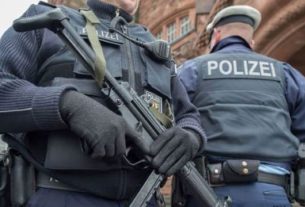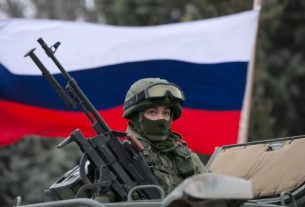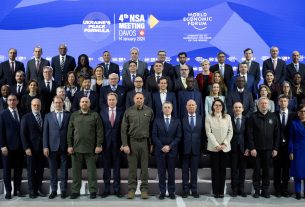The European Union has agreed in principle to a deal that would use the proceeds from frozen Russian assets to supply weapons for Ukraine. The bloc said the first payments could be made by the summer, despite calls by Washington for its European allies to go much further and fully seize Russia’s billions for the benefit of Kyiv.
EU officials welcomed the agreement. Writing on X, formerly Twitter, EU Commission President Ursula von der Leyen said Thursday, “there could be no stronger symbol and no greater use for that money than to make Ukraine and all of Europe a safer place to live.”
The EU’s Trade Commissioner, Valdis Dombrovskis, wrote that the first $1 billon should be available by the summer, mainly for military support. “Russia will pay directly for its crimes,” Dombrovskis said.
Assets frozen
Western financial institutions and companies are holding billions of dollars of cash and assets of Russia’s central bank, which were frozen by Europe and the United States in the wake of Moscow’s February 2022 full-scale invasion of Ukraine. About 70% of the assets, amounting to more than $200 billion, are held in Brussels at Euroclear, a financial services company and clearing house that specializes in cross-border securities transactions and the safe-keeping of assets.
The United States, along with Britain and Canada, have been pushing for those assets to be fully seized and used to help Kyiv fight Russia’s invasion. Last month, Washington passed legislation allowing it to seize Russian foreign currency reserves within the United States to fund weapons for Ukraine.
European caution
However, Europe is being more cautious. European Union ambassadors meeting in Brussels Wednesday agreed in principle to use only the interest earned on the Russian assets.
Ian Bond, a foreign policy analyst and Russia specialist at the Center for European Reform, said Brussels could go further.
“What the EU is talking about is not seizing the principal – but using the interest, which might amount to seven or $8 billion a year and using that for the benefit of Ukraine,” Bond told VOA. “It’s a worthwhile sum of money, but it is a tiny sum of money compared to the amount of damage that Russia has done to Ukraine and the amount of money that Ukraine needs to keep its government services and its war effort going.”
The deal should be fully signed off at an EU finance ministers’ meeting on May 14.
German Chancellor Olaf Scholz said the bloc must act quickly to support Ukraine.
“The funds available there can be used not only for procurement (of weapons) within Europe, but also outside Europe. Because what really matters now is that weapons can be delivered as quickly as possible,” Scholz said Monday during a visit to Latvia.
EU fears
Some in Europe fear that the U.S. plan to fully seize Russia’s assets would trigger a lengthy legal battle and may prompt other countries like China to sell their euro investments, destabilizing the currency.
Neutral EU states, including Hungary and Austria, objected to using the profits to buy Ukraine weapons. The EU has secured their agreement by ringfencing around 10 per cent of the Russian windfall profits for humanitarian aid.
Russian retaliation
Russia last month warned the West against seizing its assets. “Russian assets must remain untouched because otherwise there will be a severe response to Western thievery,” Russian Foreign Ministry spokeswoman Maria Zakharova wrote on Telegram April 28.
There are concerns in Europe that Moscow will retaliate by seizing more assets belonging to Western companies still operating in Russia.
Those companies may find little sympathy in the West, suggests analyst Ian Bond.
“My view on that is these companies have had two years to get out of the Russian market. If they stayed in, it was because they thought it was okay to continue to earn money in Russia, despite the fact that it was waging a brutal war of aggression against one of its neighbors. And if they lose their shirts now, that’s their tough luck,” he said.
“There are European assets in Russia that the Russian government could seize. And it has in some cases already seized the assets of Western private companies in Russia. But I don’t think that the amounts would match up,” Bond added.
EU officials hope the deal will be fully implemented by June, when Hungary is due to take over the rotating EU Council presidency. Analysts say there are concerns within the EU that Hungary’s Prime Minister Viktor Orban could try to block the deal if it isn’t fully signed off by then, as he seeks to maintain close ties with Russia.__VOA News





